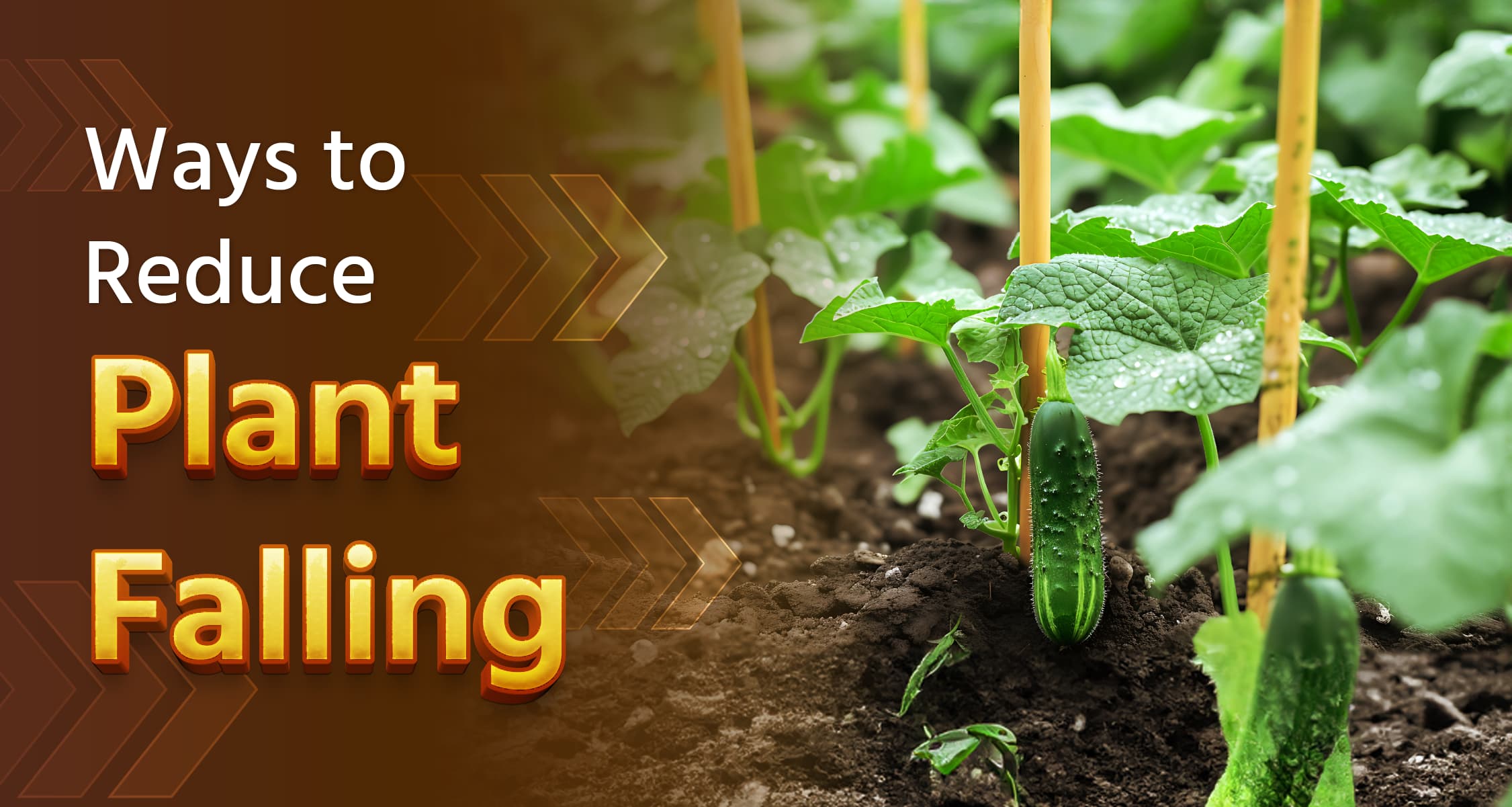Ways to Reduce Plant Falling

Our farmers toil every day in the field to get a good quality harvest. However, despite numerous attempts, sometimes plants fail to develop properly. One reason for this is plant lodging, which results in reduced yield and quality of crops. Plants bearing fruits or crops with heavy foliage are more prone to lodging. In such cases, providing support to plants is crucial for their better growth. Through this post, you can learn in detail about the benefits of providing support to plants and various methods to do so.
Reasons for Plants Fall in the Field
- Heavy Rainfall: Heavy rainfall can lead to waterlogging in the fields, weakening the roots of plants and increasing the likelihood of them falling.
- Strong Winds: Sometimes, strong winds can cause the stems or weak branches of plants to bend and fall.
- Weight of Fruits and Vegetables: Vegetables like bottle gourd, watermelon, pumpkin, etc., which grow in plants, are heavy and large. The weight of these fruits and vegetables also poses a risk of plants bending and falling.
Damage Caused by Falling Plants
- Decrease in Yield: The direct impact of plants falling in the field affects the crop yield, potentially leading farmers to face significant losses in the market.
- Quality of Crop: When plants fall, the fruits they bear may get damaged or bruised, affecting their quality and making it difficult to fetch a reasonable price in the market.
- Increased Occurrence of Diseases and Pests: Plants that have been damaged are more susceptible to diseases and pests, as their resistance decreases, making them an easy target for various diseases and pest infestations.
Benefits of Providing Support to Plants:
- Disease and Pest Resilience: Without support, fruits often rest on the soil surface, making them vulnerable to soil-borne pests and diseases. Supporting plants can help prevent this issue, ensuring healthier fruits are free from various diseases and pest attacks.
- Increased Plant Density in Limited Space: Plants require ample space to spread out like vines. By providing support, they can grow vertically instead of spreading horizontally, allowing for more plants to be grown in a smaller area.
- Control of Plant Breakage: Plants sometimes break and fail to develop properly without support. Providing support is crucial for proper plant development, leading to increased yield in crops.
- Sunlight and Air Circulation: When plants sprawl on the ground, they often receive insufficient sunlight and air circulation, leading to stunted growth and susceptibility to diseases. Supporting plants ensures adequate exposure to sunlight and airflow, promoting healthier growth and reducing the risk of diseases.
Ways to Prevent Plants from Falling:
- Staking: Staking is an easy option to provide support to plants. Use bamboo sticks, wood, or metal rods for this method. First, insert the stick or rod into the soil. Then, tie the main stems of the plants with string or soft cloth. It's a better option for crops like tomatoes, eggplants, peppers, beans, cucumbers, etc.
- Caging: Nowadays, various types of bamboo, wire, or plastic cages are available in the market. Attach it around the plants on all sides. Pay attention to its height while attaching it so that plants have enough space to grow. It's more useful for sprawling plants like tomatoes.
- Trellising: Choose sturdy materials like bamboo, wood, or metal pipes to build a trellis in the field. It should be around 6 to 7 feet tall. Secure the bamboo, wood, or pipes firmly into the ground. Tie them at the top with a strong rope or wire. Then, tie the plants onto it with twine. This method can provide support to crops like bitter gourd, bottle gourd, cucumber, pumpkin, etc.
- Earthing up and Mulching: Due to the weight of ears or heavier sugarcane crops, there's a risk of plants falling. In such cases, soil is piled up around the base of the plants to prevent them from falling. You can also apply mulch or leaves around the plants to support and prevent them from falling.
What method do you use to prevent plants from falling? Share your answer with us in the comments. For more interesting tips and information like this, follow the 'Desi Jugaad' channel now. Also, don't forget to like and share this post.
Frequently Asked Questions (FAQs)
Q: What is used to support plants?
A: Stakes, cages, hoops, trellises, bamboo sticks, etc., are used to support plants.
Q: How is a trellis made?
A: A trellis can be made from bamboo, wood, iron rods, plastic netting, etc. Additionally, you can also construct a trellis in the field using cement poles. Trellises made from cement poles are permanent but incur higher costs.
Q: Which plants require support?
A: Vine plants such as grapes, beans, bitter gourd, ivy gourd, ridge gourd, bottle gourd, cucumber, sponge gourd, pumpkin, money plant, etc., require support. Additionally, plants like tomatoes, eggplants, and peppers may also need support.
जारी रखने के लिए कृपया लॉगिन करें

फसल चिकित्सक से मुफ़्त सलाह पाएँ
